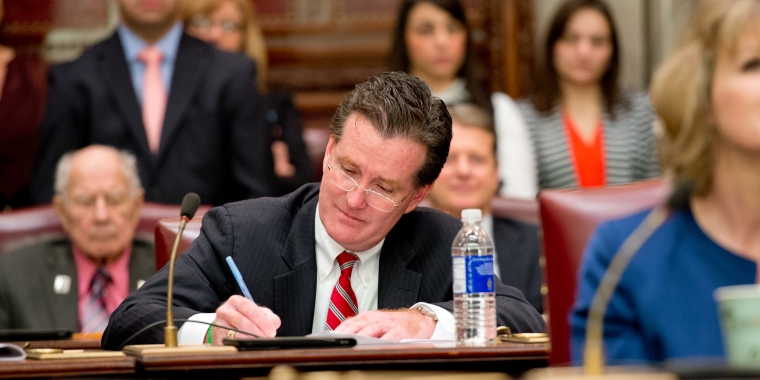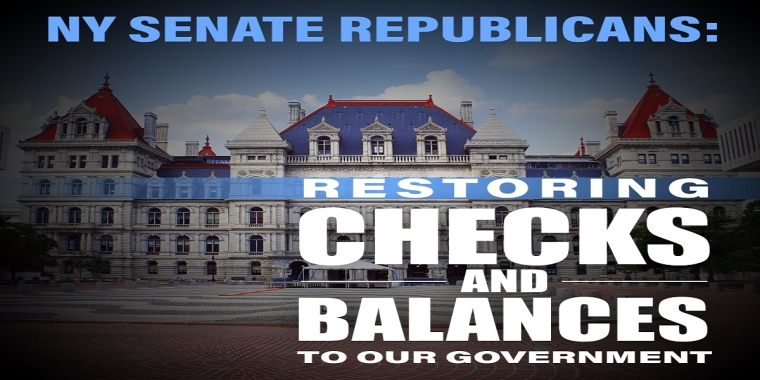
Senate Democrats Deny Long Island Taxpayers Vital Protection From LIPA Tax Grievances
March 11, 2019

Senate Republican Conference Leader John Flanagan (2nd Senate District) today proposed a vote on legislation (S.2852), which would help protect taxpayers from harm in regard to the LIPA/National Grid tax certiorari lawsuit. The legislation, which is co-sponsored by Senators Kenneth LaValle (1st Senate District) and James Gaughran (5th Senate District), was unanimously rejected by the Senate Democrats.
“Everyone on Long Island has known for years the potentially devastating effects that LIPA's tax grievance lawsuit poses to taxpayers and local municipalities. In the current lawsuit involving the Town of Huntington, if LIPA were to succeed at trial, the Town and residents will face financial instability for decades to come - forcing businesses to close, crippling our local economy, driving property values down and producing significant tax increases to all residents - particularly in the Northport-East Northport School District. We have continually encouraged the parties to reach an amicable settlement that provides municipalities and taxpayers with a glide path over a much longer period of time than LIPA has offered. With that glide path, and the enactment of my legislation, taxpayers would get the relief they need and deserve to ease the burden of revenue loss resulting from a LIPA court judgement or settlement. The rejection of my legislation by Senate Democrats is an affront to all Long Island taxpayers impacted by these lawsuits,” stated Senator Flanagan.
Senator Flanagan's legislation would enable localities and school districts adversely impacted by a tax certiorari judgment or an agreed upon settlement to access funding from the Electric Generation Facility Cessation and Tax Certiorari Mitigation Fund to help offset losses in revenue.
Monies were added to this Fund as part of the 2018-19 enacted state budget and Senator Flanagan's bill would make the Fund available to local government entities that have a reduction of real property taxes or payments in lieu of taxes of twenty percent or more as a result of a tax certiorari judgment or settlement.
Under Senator Flanagan’s legislation, local governments and school districts would be eligible to apply for one payment per year up to a maximum of fifteen years once a final judgment or settlement has been reached. The state funding will help cushion future impacts of a judgment or settlement and enable local entities to adjust their budgets over a period of years while preventing an undue tax burden.
The funding provided to schools and municipalities in relation to any settlement or decision of the LIPA lawsuit would be a percentage of any loss of revenue starting at up to 80 percent restoration in year one and varying percentages throughout the remaining fourteen years:
- Year 1: up to eighty percent of loss of revenues
- Year 2: up to seventy percent of loss of revenues
- Year 3: up to sixty percent of loss of revenues
- Year 4: up to fifty percent of loss of revenues
- Year 5: up to forty percent of loss of revenues
- Year 6: up to thirty percent of loss of revenues
- Years 7-15: up to twenty percent of loss of revenues
In addition to the state funding mechanism, the legislation would help protect taxpayers and schoolchildren by providing affected schools districts with permission to establish a tax certiorari stabilization reserve fund. If approved by voters of the district, the reserve fund would allow school districts to receive annual payments from the Electric Generation Facility Cessation and Tax Certiorari Mitigation Fund and then to withdraw these funds for the purpose of lessening or preventing increases in the district's tax levy.
Last year, the legislation was passed with bipartisan support from Democrat Senators from Long Island. It also was supported by Nassau County Executive Laura Curran, Town of Brookhaven Supervisor Ed Romaine and Town of Huntington Supervisor Chad A. Lupinacci.
The legislation is sponsored in the New York State Assembly by Assemblyman Charles Lavine (13th Assembly District).



